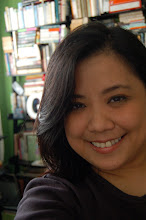 My interest in fiction has always been that of a reader. I've never dared to analyze the art and science of fiction. In my brief, limited, and safe writing career, I've focused on the known -- on the formulaic and not-too-demanding field of business writing.
My interest in fiction has always been that of a reader. I've never dared to analyze the art and science of fiction. In my brief, limited, and safe writing career, I've focused on the known -- on the formulaic and not-too-demanding field of business writing.
But Doris Lessing has opened a dangerous, little porthole to wander in and wonder about that thing called fiction writing. Don't be alarmed. I linger far from the possibility of birthing a novel from the depths of my bowels; no, please, no. It's just that Lessing has made me wonder how one can write so tautly with no tinge of superfluity. How one can conjure images and flesh out ideas with language so well thought of. So intelligent. But raw with base human emotions. Who writes like that?
Lessing does. And I can only bite my lip in envy.
The Grandmothers is the carrier story in a collection of 4 short novels. That's probably the thing going against the book; the novels are too short. Each of them can be developed into full blown books that can eventually be developed into full blown major motion pictures. But that is the beauty of this book -- it gives you just enough to chew on, without overexplaining. The short story quality of it that leaves you a little bit unsatisfied reassures you that this book will not become all that popular and you're one of those lucky enough to be in on the secret.
The Grandmothers is an almost incestuous, but certainly scandalous, story of two women. Two golden, beautiful women who fall in love with their golden, beautiful selves. When their lives turn out to be less than the perfection they worked so hard to make it to be, they shut out the world, look within the pocket-sized, controllable world covered by their golden halo, and love only those who belong to that perfect circle -- each other's son. Golden, beautiful boys who fall in love with their older female mirrors too.
Lessing writes in a way that casts no judgment. The reader is left to make her own. To be mesmerized by such a fantastic premise, or to say ewww and be morally offended -- your choice. I felt a little bit of both. The story does not end well for the grandmothers and their sons. Which is probably well and good.
The second story, Victoria and the Staveneys, struck me as somewhat ordinary. But I suspect it is a limitation of my ability to understand the nuances more than a limitation of Lessing's storytelling. Somewhere in there are messages on race, tolerance, hypocrisy, poverty, privilege, socialism, communism, and all sorts if isms. They escape me at the moment. Okay, maybe a very long moment.
I am torn between the first and the third as my favorite of the collection. The Reason for It, classified by reviews as science fiction, is an all too real account of civilization. It is a story about the conflicts between new and old, between progress and tradition. The story is told from the perspective of the old and traditional who whines about a dying culture. And so if one were to take the side of the storyteller, one would ache at how the world has regressed instead of progressed. How art suffers and knowledge is mocked as the newfangled becomes the new standard of what is good, beautiful, and right. And culture disintegrates and society is transformed into a sad, shallow shadow (alliteration unintended) of its former glory.
This is probably the most preachy of the stories. It talks about the emptiness of beauty when it is unmatched, unsubstantiated by a fine nature and a good mind.
It is also the most thought provoking. I have visions of throwing this to my book club friends who would act like frenzied alligators at feeding time as they apply every nosebleed inducing framework to analyze this. Shhh, I won't tell them about it.
The collection ends with A Love Child. A bit predictable. On the side of sappy. And the most likely to be made into a movie starred by Ben Affleck. Which is not to say it is shallow because it is loaded with meaning and still beautifully written.
It's been months since I finished the book. And I'm now over the fiction-writing itch. But I'm not over Doris Lessing yet.
Monday, August 24, 2009
The Grandmothers by Doris Lessing
Posted by
gege
at
9:43 AM
![]()
Labels: my book lust
Subscribe to:
Post Comments (Atom)












0 comments:
Post a Comment